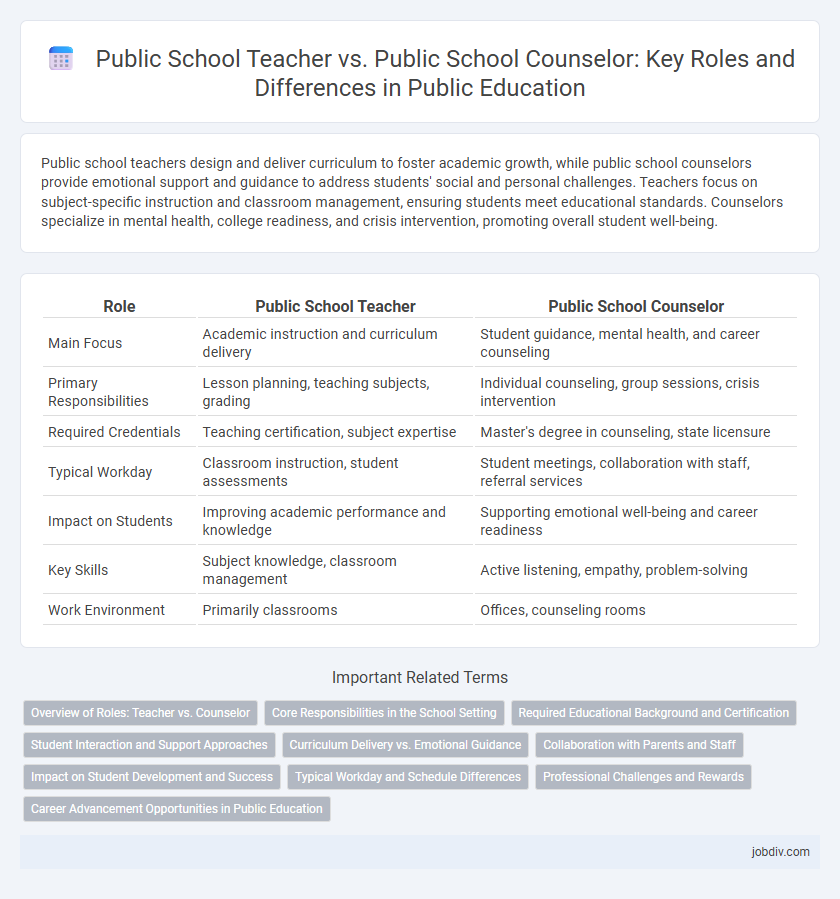Public school teachers design and deliver curriculum to foster academic growth, while public school counselors provide emotional support and guidance to address students' social and personal challenges. Teachers focus on subject-specific instruction and classroom management, ensuring students meet educational standards. Counselors specialize in mental health, college readiness, and crisis intervention, promoting overall student well-being.
Table of Comparison
| Role | Public School Teacher | Public School Counselor |
|---|---|---|
| Main Focus | Academic instruction and curriculum delivery | Student guidance, mental health, and career counseling |
| Primary Responsibilities | Lesson planning, teaching subjects, grading | Individual counseling, group sessions, crisis intervention |
| Required Credentials | Teaching certification, subject expertise | Master's degree in counseling, state licensure |
| Typical Workday | Classroom instruction, student assessments | Student meetings, collaboration with staff, referral services |
| Impact on Students | Improving academic performance and knowledge | Supporting emotional well-being and career readiness |
| Key Skills | Subject knowledge, classroom management | Active listening, empathy, problem-solving |
| Work Environment | Primarily classrooms | Offices, counseling rooms |
Overview of Roles: Teacher vs. Counselor
Public school teachers primarily focus on delivering curriculum-based instruction in subjects such as mathematics, science, and language arts, aiming to foster academic achievement and critical thinking skills among students. Public school counselors concentrate on supporting student development through academic advising, career planning, and addressing social-emotional challenges, facilitating a holistic approach to student well-being. Both roles collaborate to create a supportive learning environment, with teachers emphasizing educational content and counselors providing guidance and mental health support.
Core Responsibilities in the School Setting
Public school teachers primarily focus on delivering curriculum-based instruction, assessing student progress, and managing classroom behavior to foster academic achievement. Public school counselors provide essential support services including academic advising, social-emotional development, career guidance, and crisis intervention to ensure student well-being and success. Both roles collaborate to create a supportive educational environment but emphasize distinct core responsibilities aligned with teaching and holistic student support.
Required Educational Background and Certification
Public school teachers typically require a bachelor's degree in education or a specific subject area, along with state certification or licensure to teach in public schools. Public school counselors need a master's degree in school counseling or a related field, plus certification or licensure specific to school counseling, which often includes supervised clinical experience. Both roles mandate passing state exams and continuing education to maintain credentials and comply with state education standards.
Student Interaction and Support Approaches
Public school teachers primarily focus on delivering academic instruction and managing classroom behavior to facilitate student learning. Public school counselors emphasize emotional and social support, providing guidance on personal issues, career planning, and crisis intervention. Both roles interact closely with students but differ in approach, with teachers fostering educational development and counselors addressing mental health and well-being.
Curriculum Delivery vs. Emotional Guidance
Public school teachers focus primarily on curriculum delivery, designing lesson plans and assessing student performance to meet educational standards. Public school counselors emphasize emotional guidance, providing support for students' mental health, social development, and college or career planning. While teachers drive academic achievement, counselors address psychosocial challenges that impact student success.
Collaboration with Parents and Staff
Public school teachers collaborate closely with parents and staff by providing regular updates on student progress, addressing academic concerns, and coordinating classroom activities. Public school counselors work with parents and staff to support students' social-emotional needs, develop intervention plans, and facilitate communication between home and school. Both roles emphasize teamwork to enhance student success and create a supportive educational environment.
Impact on Student Development and Success
Public school teachers directly influence student academic achievement by delivering curriculum and fostering critical thinking skills in classrooms. Public school counselors enhance student development by addressing social-emotional needs, providing career guidance, and facilitating access to mental health resources. Together, teachers and counselors create a comprehensive support system that improves overall student success and well-being.
Typical Workday and Schedule Differences
Public school teachers typically spend their workday delivering lessons, grading assignments, and managing classroom activities from early morning until mid-afternoon, often extending into after-school hours for meetings or preparation. Public school counselors have a more varied schedule that includes student counseling sessions, crisis intervention, and collaboration with parents and staff, usually with a flexible timetable that extends beyond class periods. Teachers follow a consistent daily routine aligned with the academic calendar, while counselors balance both scheduled appointments and impromptu student needs, making their workdays less predictable.
Professional Challenges and Rewards
Public school teachers face professional challenges such as managing diverse classrooms, meeting standardized testing requirements, and addressing varying student academic needs, while their rewards include fostering student knowledge and witnessing academic growth. Public school counselors navigate challenges like handling students' emotional and social issues, coordinating with parents and staff, and balancing caseload demands, with rewards centered on supporting student well-being and promoting mental health. Both roles demand strong interpersonal skills and dedication, offering fulfillment through positively impacting students' educational and personal development.
Career Advancement Opportunities in Public Education
Public school teachers advance their careers by pursuing roles such as lead teacher, department head, or instructional coordinator, often requiring additional certifications or higher education degrees. Public school counselors enhance their advancement prospects by becoming lead counselors, school counseling supervisors, or district-wide mental health coordinators, leveraging specialized training in guidance and mental health services. Both careers benefit from professional development and continuing education tailored to educational leadership and student support services.
Public School Teacher vs Public School Counselor Infographic

 jobdiv.com
jobdiv.com